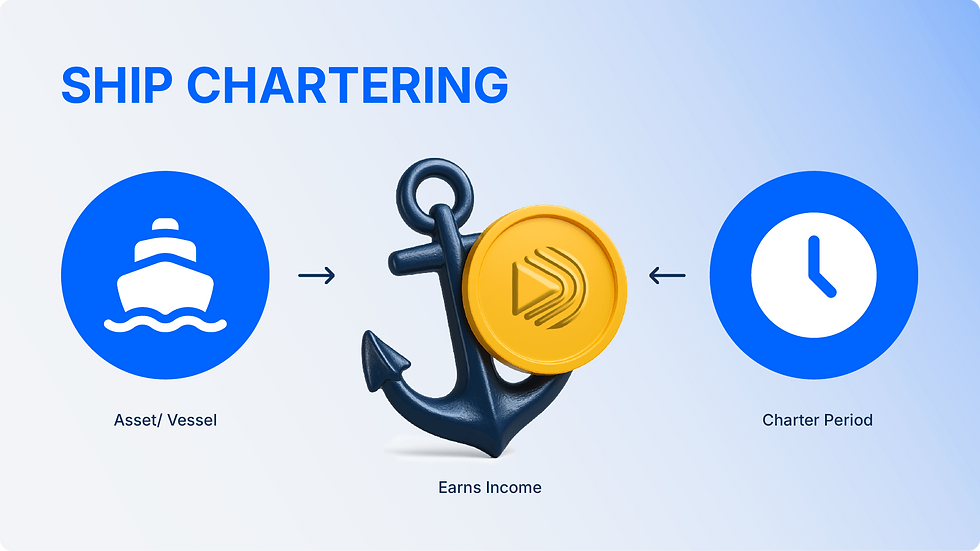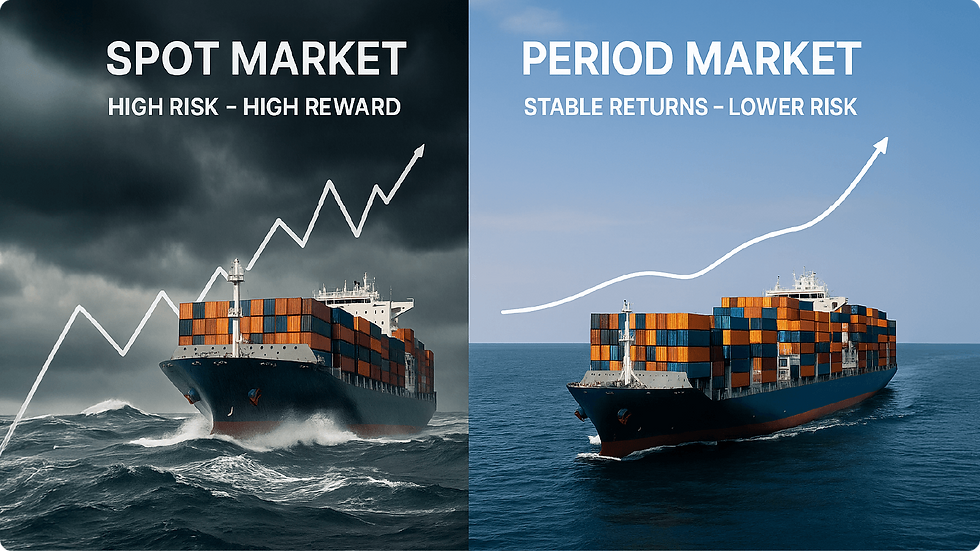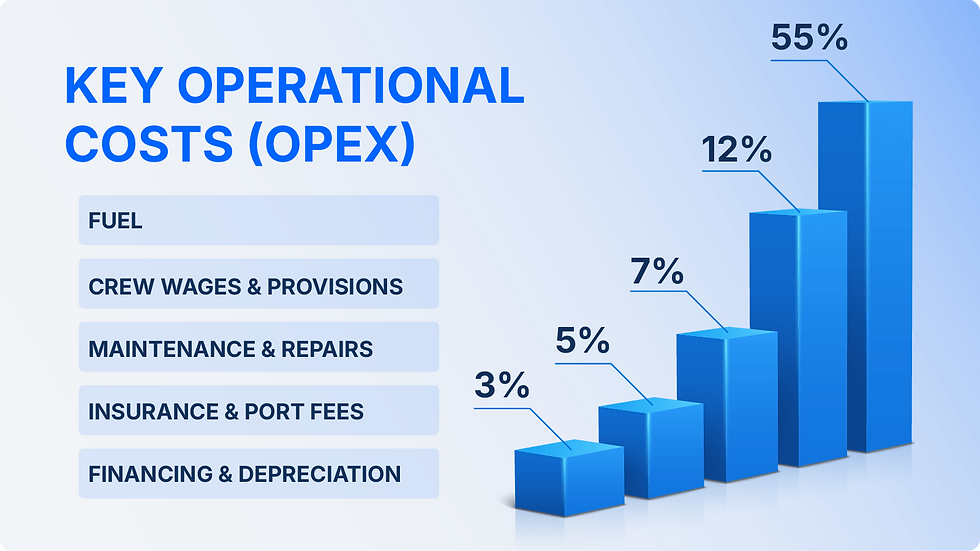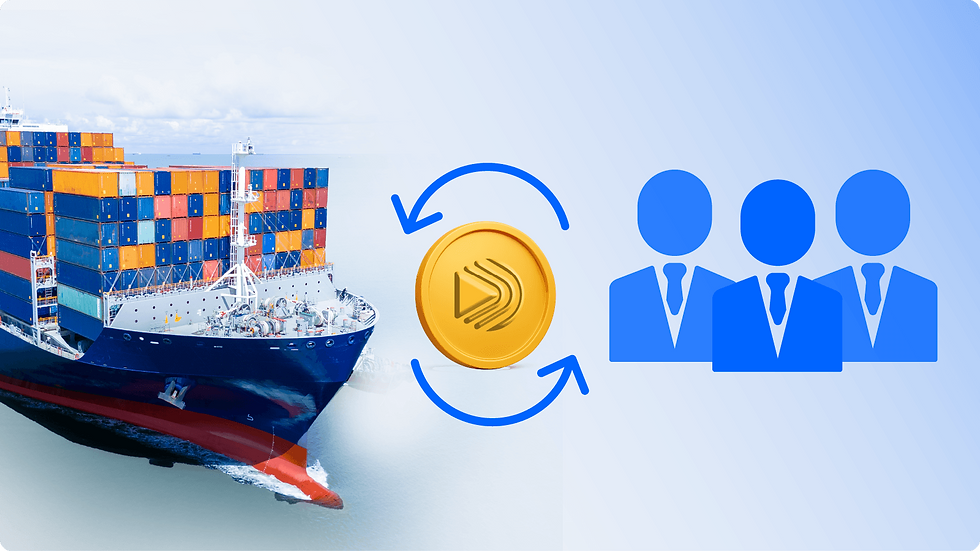How do Ships Earn Money: A Beginner's Guide
- Chandrama Vishawakarma
- Aug 8, 2025
- 5 min read
Updated: Oct 28, 2025

Introduction: The Unseen Engine of Global Wealth: How Do Ships Make a Fortune?
Every day, over 100,000 commercial ships sail the world’s oceans, silently powering an economy worth trillions. These aren't just big boats; they're sophisticated, profit-making machines. Yet, for most of us, the business of shipping is a complete mystery.
Have you ever wondered how a ship, a single floating asset, manages to make money, and what secrets lie behind a shipowner's profit?
This article will pull back the curtain on the business of shipping, explaining in simple terms how ships earn money. We'll explore where their money comes from, the huge costs they face, and how they turn a profit. And, importantly, we'll reveal how Shipfinex is changing this old-school model, making it possible for you to get in on the action and share in the wealth of global trade.
The Main Way Ships Make Money: Renting Them Out

The most common way a ship earns money is by being rented out. This process is called chartering. It's like a shipowner renting their vessel to a company that needs to transport goods. The fee paid for this service is called the freight rate, and it's the main source of income for a ship.
There are two main types of charter agreements:
Voyage Charter: The ship is rented for a single trip. The owner agrees to carry a specific amount of cargo from one port to another for a fixed fee. The owner handles all the running costs, including fuel and crew salaries.
Time Charter: The ship is rented for a set period of time, such as one year. The owner still provides the ship and crew, but the company renting the ship pays a daily or monthly fee and is responsible for variable costs like fuel and port fees.
The Market Dance: Choosing the Right Strategy

A shipowner's business is all about strategy. They have to decide whether to rent their ship for a single trip (the Spot Market) or for a longer period (the Period Market).
The Spot Market is like a daily rental service. It's for short-term trips and is highly dependent on current demand, so rates can change quickly. This can lead to big profits when the market is hot, but it's also very risky.
The Period Market, on the other hand, is like having a long-term lease. It provides a steady, predictable income stream for months or even years, which helps protect the owner from market downturns.
A clever shipowner constantly watches the market, deciding whether to chase high, short-term profits or lock in a stable income for the long haul.
But how do Ship owners earn money
For a shipowner, net earning is what's left after all expenses are subtracted from the revenue. While charter fees are the main source of income, a ship's value can also appreciate over time, offering a secondary source of profit. However, the costs of running a ship are substantial and must be carefully managed.

Key operational costs (OPEX) include:
Fuel: This is often the largest single expense for a vessel, sometimes accounting for up to 60% of a ship’s total operational costs .
Crew Wages & Provisions: Salaries, insurance, and food for the crew are a significant and consistent expense.
Maintenance & Repairs: Regular dry dockings and unforeseen repairs are a major cost, with a large tanker's dry docking often costing over $1 million .
Insurance & Port Fees: Vessel insurance and fees for using ports are mandatory costs of operation.
Financing & Depreciation: This includes the cost of repaying loans used to purchase the ship (CAPEX) and accounting for the asset's depreciation over its lifespan.
A shipowner's skill lies in balancing these massive costs with the revenue generated from chartering to achieve a sustainable and healthy profit margin.
How Shipfinex Changes the Game

For centuries, this profit belonged only to the shipowner: a title reserved for those with immense capital. But Shipfinex is changing that by making it possible for you to participate.
How Shipfinex distributes these earnings: Our platform allows you to buy a small piece of a ship. This means that when the ship makes money from being chartered, a portion of that profit is distributed to you, directly and securely. This system makes the profits that were once exclusive to a single shipowner now available to a wider community of investors. You get to earn a transparent and regular income from a real, tangible asset.
Our Commitment to Investor Protection and Trust
Opening up a traditional industry like shipping requires building on an unshakeable foundation of trust. Thoughtful investors naturally have questions about how their earnings are secured, how their capital is protected, and how the entire ecosystem is governed. Here is a comprehensive overview of the Shipfinex framework, designed to ensure security and transparency at every step.
A Secure and Automated Flow of Earnings
To ensure earnings are distributed fairly and without interference, funds are managed within a protected structure. When an asset owner receives charter income, these funds flow into a dedicated bank account for that specific vessel. This entity operates independently of the shipowner's direct control. From this account, operating expenses are paid only if they align with pre-approved budgets. The remaining net earnings are then converted to USDC for automated, transparent distribution to all token holders through blockchain-based smart contracts.
Multi-Layered Safeguards Against Misconduct
Multiple protective layers shield investors from potential misconduct. The asset-holding entity undergoes rigorous quarterly financial audits, with detailed expense reporting shared transparently with our investment community. All legal frameworks are established by leading international maritime law firms to be robust and enforceable. Crucially, should an asset owner fail to meet their obligations, the physical vessel serves as the underlying collateral, held securely within the dedicated legal structure to protect investor capital.
Comprehensive Governance and Regulatory Oversight
Our governance model combines legally regulated entities with technologically enforced accountability. Asset owners cannot access funds beyond the pre-declared operational budget, and enforceable legal protections maintain accountability across all participants.
Our framework is designed to provide you with powerful and unwavering security. For you, the ship ownership is protected by three pillars of established governance.
Anchored by Maritime Law
First, every asset operates under heavily regulated and long-established maritime law. This governs the vessel’s registration, insurance, and operational safety, ensuring the physical asset is managed and protected according to the highest global standards.
Adhering to Global Banking Standards
Second, for all financial operations, we are held to the same rigorous standards for compliance and transparency as global banks. This means your funds are managed with institutional-grade security and accountability. To uphold this promise, the operations and financial accounts of each ship are rigorously audited every quarter by an independent, third-party.
Secured by Modern Digital Asset Rules
Finally, our platform is governed by modern digital asset regulations. These rules are specifically designed to mirror the robust investor protections of the traditional financial system, ensuring your digital ownership is secure and reliable.
These three pillars interlock to create a comprehensive shield for your investment, providing a transparent, secure, and fully compliant platform.
Have More Questions? We're Listening.
We believe that thoughtful questions from our community make our platform stronger, and we look forward to answering more of them in our weekly newsletters. Your trust is built on transparency, and we are committed to providing it.
If you have a question, please don't hesitate to reach out. We are listening at:
Email: [email protected]
WhatsApp: +971 50 687 6254
Until next time,
Team Shipfinex


